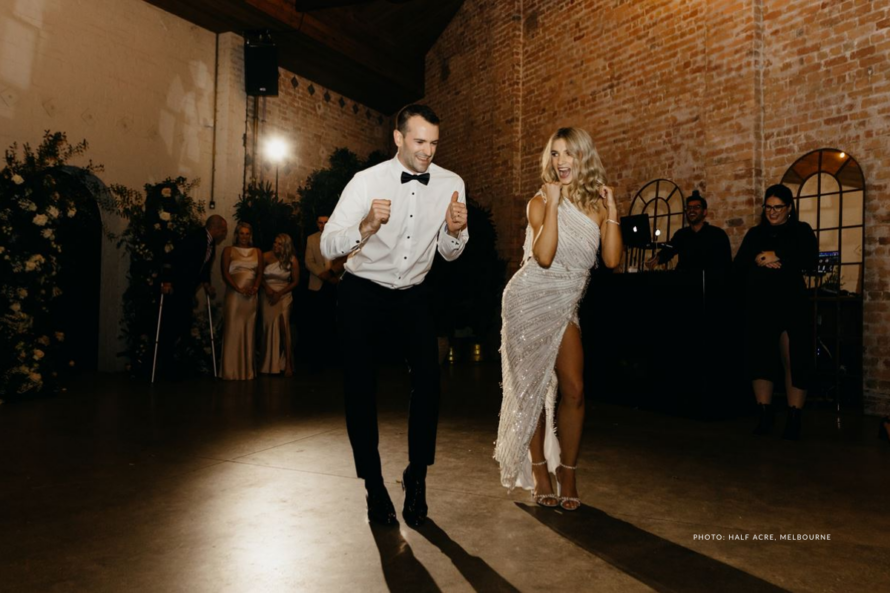Weddings are known to be stressful, and can bring out the bridezilla (groomzilla or, even, bridesmaidzilla) in all of us. But what is it that makes a wedding stressful and what can we do about it? Here are some ways to bust that stress and enjoy this special time of your life.
What is stress?
“Stress is the body’s response to being forced to operate outside its comfort zone,” says Melbourne-based Strategic Therapist and relationship expert Phil Owens,. “When we are in our comfort zone, we know we can cope.
“When we are pushed outside of our comfort zone, our minds and bodies fire up additional arousal and responsiveness processes to help us cope,” he adds.
In extreme cases, this shows up as the ‘fight or flight’ response, with increased blood pressure, heart rate, sweating, change in focus and attention.
“We all have a ‘stress threshold,” adds Phil whose business Reflective Resolutions, specialises in helping couples address any anxieties, fears and relationship issues, particularly in the lead-up to their wedding day.
When we are on the good side of this threshold, we can use logical thinking to solve our problems. Once we are pushed over our threshold, logic goes out the window, and we rely on instinctive, emotional and primitive responses to help us cope.
We can be pushed over the threshold by an acute stress (a single big stressor), or by chronic stress (a build-up of many small stressors). Weddings often have a mix of both types!
Why are weddings stressful?
Think of all of the stressors that are in play for a wedding:
- Expectations (especially unrealistic ones) that we try to meet
- Lack of control (so many things are not in your control, and could go wrong!)
- Uncertainty – so much is unknown, and this day marks the rest of our future.
- Social stuff – whenever we have to deal with people and relationships, it can be stressful
Each of these pushes us outside of our comfort zone, and can make us feel stressed
What happens when we are stressed?
“When people are stressed, they stop thinking and start reacting,” says Phil. “Apart from the unpleasant physical signs of stress, people will also stop listening, stop thinking logically and start reacting defensively.
“This can be seen in the five defensive behaviours: Blaming, Denying, Justifying, Avoiding and Attacking. These are the specialities of the Bridezilla, and a clear sign that their stress threshold has been smashed.”
The 7 things to help bust stress.
Realise you are not actually being attacked by a bear.
It is important to pay attentions to the signals of the stress response, and view things in perspective. Most of the stress is not life threatening, even though we are interpreting it as such. When we reach our stress threshold, we stop thinking logically and respond emotionally and instinctively.
“The physiological response of ‘fight or flight’ is the same one that you would you use if you were being attacked by a bear,” says Phil. “In reality, few brides ever get attacked by bears. However, as we misinterpret emotional, social and psychological stressors, they can push us to have the same response.”
Paying attention to the feelings and shifts in our physiology that occur as we approach our threshold allows us to intervene. When we reach threshold, realising that we are not under physical threat can help us review where we are at and take steps to calm ourselves back down into a more comfortable frame of mind.
Create space and settle down
“Get out of overwhelm and create the space to allow yourself to calm down,” adds Phil. “When we remove the stressors down to below our threshold level, we shift out of instinctive response and can start to think straight.”
By creating space, our physiology and neurology can calm back down to normal. In the midst of all of the overwhelm of planning, make sure you have set aside time for yourself, for relaxing, for connecting with friends – whatever it is that simply allows you to escape the pressure cooker and to settle back to normal. This stops the chronic effect that stress can have as all the little things build up to complete wedding overwhelm.
Realise it is a milestone and not the outcome
“Reinterpret the stress by putting it into perspective,” advises Phil. “The wedding is a milestone on the journey to the rest of your life. The goal is the happy life together with your partner.”
Put things into context: in five years, the wedding is a day that is hopefully a happy memory. If you make the milestone the only thing that matters, you can miss the real goal. By keeping the real goal in mind, small things that can seem stressful or problematic for the wedding day can seem so much less challenging in the perspective of a lifetime of happiness.
Get the ducks in a row
“Reduce overwhelm by limiting the flow of stressors,” Phil suggests.
“By having a time plan and creating an order of when things will get done, we see one duck at a time, rather than getting attacked by the whole flock.
“Being planned allows you to prepare for the stressors as they come, and to limit the number of stressors so that we don’t get pushed over our threshold.”
Leaving everything to the last minute is sure to pile on the stress, whereas taking a methodical, planned approach can allow you to deal with each thing on its merits, without being pushed over your threshold.
It is not a perfection sport!
Although we want to end up with the perfect day, it is made up of many moving parts. If we set unrealistic expectations about how things should be, the gap to reality is often enough to drive perfectionism – that sense of pass or fail in every detail.
“One thing that is true is that stuff happens,” says Phil. “Even the best planned event can have things happen to throw it off course.
“Weather, traffic, illness, a mess-up…all little things that can add complexity and stress to your day.
“The key is having a resilient response – know that stuff can happen, that yo u have planned as best as you can.”
The truth is that it is not what happens, but rather how you interpret it and respond to it. You cannot know what is going to happen, but even if everything ends up in chaos, you can either end up with brilliant wedding stories of how you and your wedding party stepped up, laughed and made the best of it, or stories told about how you were the Bridezilla that crumbled. It is all in the interpretation and the response.
Spread the load!
Get help. When we get into overwhelm, it is a common defensive response to try to cope alone. However, this just amplifies the stress. Before you reach your threshold, make sure you recruit helpers – to deal with some of the stressors, to help you pay attention to your responses (when you are getting stressed) and helping you take time out when you need it.
Here’s a great read about the responsibilities of a maid of honour. Make sure you choose yours wisely!
Be responsible!
Know you can’t know what is going to happen.
“Uncertainty is the the only certainty with any event,” says Phil. “If we believe we can control everything, then it is easy to become stressed.
The truth is that you cannot control circumstances, what other people do or think, or things like the weather. The only thing you can control is your response, he adds.”
Think of it this way – on your wedding day, your only responsibility is your ‘response ability’. Keeping yourself in a state to keep responding logically and with your bigger purpose in mind can allow you to ask a great question like ‘what is the next thing I can do?’ Rather than a stress question like ‘why me?’ Or ‘what if?’
“So, as your big day approached, work to stay above the ‘stressed’ threshold and you can create a really brilliant wedding!”
Another great way to reduce your stress during the wedding planning process is to hire a wedding planner. Find one in your local area here.






